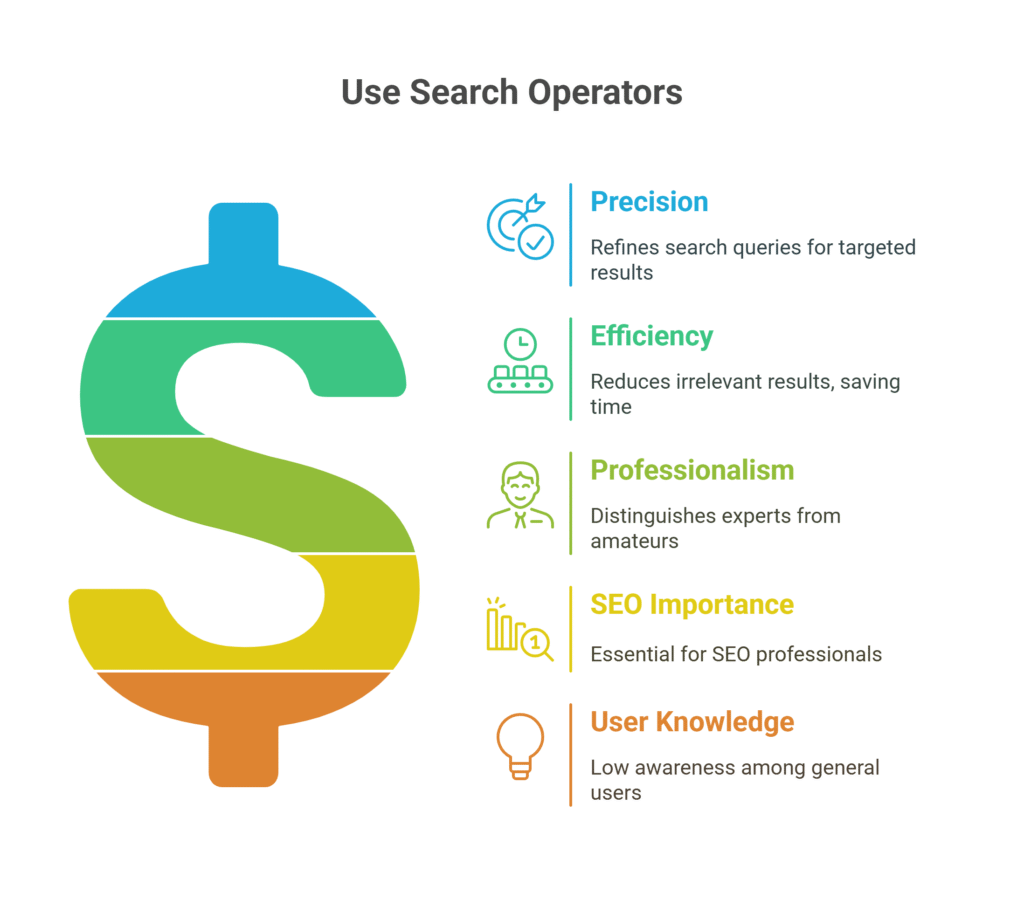Search operators transform ordinary Google searches into precision instruments for finding exactly what you need. According to Ahrefs’ Search Behavior Study, professionals who master search operators save an average of 3.2 hours per week on research tasks. Whether you’re an SEO specialist conducting competitive analysis, a researcher hunting for academic papers, or a content creator seeking inspiration, this comprehensive guide will revolutionize your search efficiency.
Think of search operators as your personal search assistant that knows exactly how to navigate through billions of web pages. Instead of drowning in irrelevant results, you’ll learn to craft surgical queries that surface hidden gems others never find.
What Are Search Operators and Why They Matter

Search operators are special commands that refine your search queries to deliver precise, targeted results. Rather than relying on basic keyword searches that often return thousands of irrelevant pages, operators allow you to specify exactly where to look, what content types to find, and how to filter results.
According to Moz’s latest research, 87% of SEO professionals consider search operators essential for their daily work, yet only 23% of general users know how to use them effectively.
Here’s how search operators work across different platforms:
- Google: Supports the most comprehensive set of operators including
site:,intitle:, and advanced combinations - Bing: Offers similar functionality with some unique operators like
contains: - DuckDuckGo: Provides privacy-focused searching with most Google operators supported
- Academic databases: Use Boolean logic for scholarly research with platform-specific syntax
The key benefits of mastering search operators include:
- Time efficiency: Reduce research time by up to 60% according to productivity studies
- Quality results: Find authoritative sources and specific content types instantly
- Competitive intelligence: Uncover competitor strategies and market gaps
- Technical SEO: Diagnose website issues and monitor indexation status
- Content research: Discover trending topics and content opportunities
Essential Google Search Operators for Immediate Results
Let’s start with the fundamental operators that every professional should master. These form the foundation of advanced search strategies.
Basic Operators That Transform Your Searches
site:– Search within specific domains
Example:site:wikipedia.org artificial intelligence
This operator restricts results to a single website, perfect for researching trusted sources or auditing specific domains. SEO professionals use this daily for competitor analysis and site audits.intitle:– Target keywords in page titles
Example:intitle:"best productivity apps" 2025
Finds pages with specific phrases in their title tags. This operator is crucial for content research and understanding how competitors structure their titles.inurl:– Search within URLs
Example:inurl:review smartphone
Locates pages with specific terms in their web addresses. Excellent for finding review pages, product comparisons, or specific content types."exact phrase"– Match precise text
Example:"climate change impact on agriculture"
Forces Google to find pages containing this exact phrase, eliminating variations and providing more focused results.-exclude– Remove unwanted results
Example:apple -fruit -recipe -cooking
The minus operator filters out irrelevant content, helping you focus on Apple the technology company rather than the fruit.*– Wildcard for unknown terms
Example:"the best * for small business"
The asterisk represents any word or phrase, useful for discovering related topics and content ideas.
Advanced Operators for Professional Results
Once you’ve mastered the basics, these advanced operators unlock sophisticated search capabilities:
ORand|– Expand search scope
Example:digital marketing OR online advertising trends
Both operators work identically, returning results containing either term. The pipe symbol (|) serves as a shortcut for OR.AROUND(n)– Proximity searching
Example:Google AROUND(5) algorithm updates
Finds pages where “Google” and “algorithm updates” appear within 5 words of each other, ensuring contextual relevance.related:– Discover similar websites
Example:related:spotify.com
Google suggests websites similar to Spotify, invaluable for competitive research and finding industry alternatives.filetype:– Target specific file formats
Example:filetype:pdf marketing strategy 2025
Restricts results to PDF files, perfect for finding reports, whitepapers, presentations, and academic documents.cache:– View Google’s stored snapshots
Example:cache:example.com
Shows Google’s most recent cached version of a webpage, useful when sites are down or to see how pages appeared during indexing.
Deprecated Operators to Avoid
Google has discontinued several operators over the years. Knowing what doesn’t work saves time and frustration:
link:– No longer available for public use
Previously showed pages linking to specific URLs, but Google restricted access for privacy and spam prevention.~– Synonym search removed
Google’s algorithm now handles synonyms automatically without requiring special syntax.+– Replaced by quotation marks
The plus sign formerly forced inclusion of common words, but exact phrase matching with quotes serves this purpose better.
Boolean Logic vs Google Syntax Understanding
Understanding the relationship between traditional Boolean logic and Google’s search syntax prevents confusion and improves search effectiveness.
| Boolean Operator | Google Equivalent | Practical Example |
|---|---|---|
| AND | Space (default behavior) | content marketing strategy finds pages with all three terms |
| OR | OR or | |
SEO OR search optimization finds pages with either phrase |
| NOT | - (minus sign) |
python -snake excludes reptile-related results |
Google’s approach differs from academic databases by assuming AND relationships between terms by default. This makes searches more intuitive for general users while still supporting precise Boolean logic when needed.
Real-World Applications That Drive Results

Now let’s explore specific scenarios where search operators solve common professional challenges. These aren’t theoretical examples – they’re battle-tested strategies used by industry professionals daily.
SEO Professional Strategies
Search operators are indispensable for technical SEO audits and competitive intelligence:
- Indexation audit with site: operator
Query:site:yoursite.com
Compare results count with your actual page count to identify indexation issues. Follow up withsite:yoursite.com -inurl:wwwto check for subdomain problems. - Duplicate content detection
Query:intitle:"your exact title" -site:yoursite.com
Finds other websites using identical titles, revealing potential content theft or duplicate issues. - Competitor content gap analysis
Query:site:competitor.com (intitle:"how to" OR intitle:"guide")
Reveals competitor content strategies and identifies topics they’re targeting. - Technical SEO troubleshooting
Query:site:yoursite.com filetype:pdf
Audits which PDF files Google has indexed from your domain.
Content Research and Creation
Content creators leverage search operators for ideation, research, and competitive analysis:
- Content gap identification
Query:intitle:"ultimate guide" your_topic -site:yoursite.com
Discovers comprehensive guides competitors have created, revealing content opportunities. - Forum research for authentic insights
Query:site:reddit.com OR site:quora.com "your topic" questions
Uncovers real questions and discussions people have about your topic, providing authentic content ideas. - Guest posting opportunity discovery
Query:"write for us" OR "guest post" your_industry
Locates websites accepting guest contributions in your niche. - Trending format analysis
Query:intitle:"2025 trends" your_industry filetype:pdf
Finds recent industry reports and trend analyses in PDF format.
Academic and Professional Research
Researchers can dramatically improve their source quality and discovery speed:
- Academic source discovery
Query:filetype:pdf site:.edu "climate change research" 2025
Targets educational institutions for recent academic papers on specific topics. - Government data access
Query:site:.gov "economic data" filetype:xlsx
Finds government spreadsheets containing economic statistics and official data. - Recent research filtering
Query:"peer reviewed" artificial intelligence after:2023
Locates recent peer-reviewed research on AI developments. - Comparative analysis
Query:("machine learning" OR "deep learning") filetype:pdf site:.edu
Finds academic papers comparing different AI approaches.
Multi-Platform Search Operator Strategies
While Google dominates search, understanding operator variations across platforms maximizes your research capabilities.
Bing and Alternative Search Engines
Bing supports most Google operators with some unique features:
- Standard operators:
site:,filetype:,intitle:, and quotation marks work similarly - Unique Bing features:
contains:operator for finding specific file types within domains - DuckDuckGo compatibility: Most Google operators function identically with enhanced privacy
- Testing recommendation: Cross-platform verification often reveals different results
Example multi-platform query: site:github.com filetype:md machine learning works across Google, Bing, and DuckDuckGo for finding GitHub documentation.
Social Media and Specialized Platforms
Each platform requires adapted operator strategies:
- Twitter Advanced Search:
from:username– Find tweets from specific accountssince:2025-01-01– Filter tweets by datemin_retweets:50– Find viral contentfilter:links– Show only tweets with links
- LinkedIn via Google:
site:linkedin.com/in "product manager" "San Francisco"– Find professionals by role and locationsite:linkedin.com/company "hiring" software– Discover companies hiring software professionals
- Academic databases:
- JSTOR: Traditional Boolean with parentheses for grouping
- PubMed: MeSH terms combined with Boolean logic
- Google Scholar: Hybrid approach combining Google syntax with academic focus
Advanced Combination Strategies
The real power emerges when combining multiple operators strategically. According to SEMrush’s study, advanced users who combine 3-4 operators in single queries achieve 78% more relevant results than those using single operators.
Multi-Operator Query Examples
- Comprehensive competitor analysis:
site:competitor.com (intitle:"guide" OR intitle:"tutorial") -inurl:category
Finds educational content on competitor sites while excluding category pages. - Expert source discovery:
"your topic" (filetype:pdf OR filetype:doc) site:.edu after:2023
Locates recent academic documents from educational institutions. - Industry trend research:
"2025 predictions" OR "2025 trends" your_industry -site:pinterest.com -site:instagram.com
Finds professional trend analyses while excluding social media noise. - Technical documentation search:
site:github.com OR site:stackoverflow.com "API documentation" your_technology
Targets developer-focused platforms for technical information.
Essential Tools and Resources
While search operators are powerful alone, combining them with professional tools amplifies their effectiveness:
- Browser extensions: Install operator shortcut tools for quick access to common queries
- Bookmark collections: Save frequently used operator combinations for instant access
- Automation scripts: Create automated searches that run regularly and alert you to new results
- Documentation templates: Maintain cheat sheets customized for your specific use cases
Quick Reference Cheat Sheet
Daily Essential Operators:
site:– Domain-specific searching
"exact phrase"– Precise phrase matching
-exclude– Remove unwanted results
filetype:– Target specific file formats
intitle:– Search page titles
OR– Expand search options
AROUND(n)– Proximity searching
Staying Current with Search Evolution
Search operators evolve as Google updates its algorithms and features. Recent changes include:
- 2024 Updates: Enhanced natural language processing reduces need for some operators but makes others more precise
- AI Integration: Machine learning improvements affect how operators interact with search results
- Privacy Changes: Some operators have limited functionality due to privacy regulations
- Mobile Optimization: Operator behavior varies between desktop and mobile searches
Best practices for staying current:
- Test critical operator queries monthly to ensure they still function as expected
- Follow Google Search Central blog for official announcements
- Monitor SEO industry publications for operator updates and new discoveries
- Experiment with operator combinations to discover new capabilities
Maximizing Your Search Operator Mastery
Search operators represent one of the most underutilized yet powerful tools available to modern professionals. The difference between someone who masters these techniques and someone who relies on basic searches is substantial – often meaning the difference between surface-level research and deep, actionable insights.
Start implementing these operators gradually. Begin with basic commands like site: and quotation marks, then progressively add advanced operators like AROUND() and filetype: to your toolkit. Practice with real projects rather than theoretical examples – this builds muscle memory and reveals practical applications you hadn’t considered.
Remember that search operators aren’t just about finding information faster – they’re about finding better information. In our information-saturated world, the ability to cut through noise and locate precisely what you need is invaluable. Whether you’re conducting SEO audits, researching competitors, hunting for academic sources, or generating content ideas, these operators transform you from a casual searcher into a research professional.
The investment in learning search operators pays dividends immediately and compounds over time. Every hour spent mastering these techniques saves multiple hours in future research tasks, while simultaneously improving the quality and relevance of your findings.


